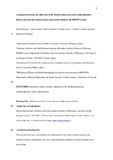Mostrar el registro sencillo del ítem
Associations between the adherence to the Mediterranean diet and cardiorespiratory fitness with total and central obesity in preschool children: the PREFIT project
| dc.creator | Labayen Goñi, Idoia | es_ES |
| dc.creator | Arenaza, Lide | es_ES |
| dc.creator | Medrano Echeverría, María | es_ES |
| dc.creator | García, Natalia | es_ES |
| dc.creator | Cadenas-Sánchez, Cristina | es_ES |
| dc.creator | Ortega, Francisco B. | es_ES |
| dc.date.accessioned | 2019-06-25T08:05:47Z | |
| dc.date.available | 2019-06-25T08:05:47Z | |
| dc.date.issued | 2018 | |
| dc.identifier.issn | 1436-6215 | |
| dc.identifier.uri | https://hdl.handle.net/2454/33498 | |
| dc.description.abstract | Purpose: Early recognition of risk factors associated with overweight/obesity is animportant step towards preventing long-term health consequences. The aim of the current study was to examine the associations of the adherence to the Mediterranean dietary pattern (MDP) and cardiorespiratory fitness (CRF) with adiposity in preschool children from thenorth of Spain. Methods: The adherence to the MDP (KIDMED), CRF (20-m shuttle run test), total (BMI) and central (waist circumference) adiposity and socio-demographic factors were assessed in 619 children (48.6% girls) who were on average 4.7 years old. Results: Higher MDP index (P < 0.05) and CRF levels (P < 0.01) were significantly related to lower waist circumference. CRF was inversely associated with BMI (P <= 0.001), yet no significant association was observed between MDP and BMI. Children not having high CRF levels and high MDP (i.e., non-upper sex-specific tertile of CRF or MDP, respectively) had the highest waist circumference. Conclusions: Our findings support that higher adherence to the MDP and higher CRF are associated with lower waist circumference in preschool children, pointing them as relevant modifiable factors to be targeted by educational strategies aiming to prevent central obesity and later obesity-related comorbidities. | en |
| dc.description.sponsorship | The PREFIT study was supported by the University of the Basque Country (GIU14/21), MM is supported by a grant of the Spanish Ministry of Education, Culture and Sports (FPU14/03329), LA by a grant of Education, Linguistic Policy and Culture Department of the Governement of the Basque Country (PRE_2016_1_0057). CC-S by a grant from the Spanish Ministry of Economy and Competitiveness (BES-2014-068829) and FBO by a grant from the Spanish Ministry of Science and Innovation (RYC-2011-09011). Additional funding was obtained from the University of Granada, Plan Propio de Investigacion 2016, Excellence actions: Units of Excellence; Unit of Excellence on Exercise and Health (UCEES); the SAMID III network, RETICS, funded by the PN I + D + I 2017-2021 (Spain), ISCIII-Sub-Directorate General for Research Assessment and Promotion, the European Regional Development Fund (ERDF) (Ref. RD16/0022); and the EXERNET Research Network on Exercise and Health in Special Populations (DEP2005-00046/ACTI). | en |
| dc.format.extent | 22 p. | |
| dc.format.mimetype | application/pdf | en |
| dc.language.iso | eng | en |
| dc.publisher | Springer | en |
| dc.relation.ispartof | European Journal of Nutrition, (2018) 57:2975–2983 | en |
| dc.rights | © Springer-Verlag GmbH Germany 2017 | en |
| dc.subject | Preschool children | en |
| dc.subject | Obesity | en |
| dc.subject | Adherence to the Mediterranean diet | en |
| dc.subject | Cardiorespiratory fitness | en |
| dc.subject | Dietary habits | en |
| dc.title | Associations between the adherence to the Mediterranean diet and cardiorespiratory fitness with total and central obesity in preschool children: the PREFIT project | en |
| dc.type | info:eu-repo/semantics/article | en |
| dc.type | Artículo / Artikulua | es |
| dc.contributor.department | Ciencias de la Salud | es_ES |
| dc.contributor.department | Osasun Zientziak | eu |
| dc.rights.accessRights | info:eu-repo/semantics/openAccess | en |
| dc.rights.accessRights | Acceso abierto / Sarbide irekia | es |
| dc.identifier.doi | 10.1007/s00394-017-1571-3 | |
| dc.relation.publisherversion | https://doi.org/10.1007/s00394-017-1571-3 | |
| dc.type.version | info:eu-repo/semantics/acceptedVersion | en |
| dc.type.version | Versión aceptada / Onetsi den bertsioa | es |


